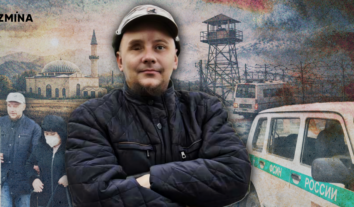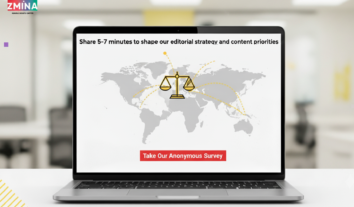Kremlin’s forgotten political prisoners in Crimea: Human rights advocates urge global focus on Ukrainian hostages at the Crimea Platform
At the Fourth Summit of the International Crimea Platform, human rights advocates called on the international community to focus on the plight of POWs, deportees, civilian hostages, and other Crimean political prisoners. Despite ongoing gross violations, media coverage of these abuses remains minimal, leaving the fate of Crimean prisoners largely overlooked.
In this article, ZMINA reveals what was debated on the sidelines of the summit, the potential prerequisites for peace, the scale of the crisis involving Crimeans persecuted by Russia, and why raising awareness is crucial to achieving justice.
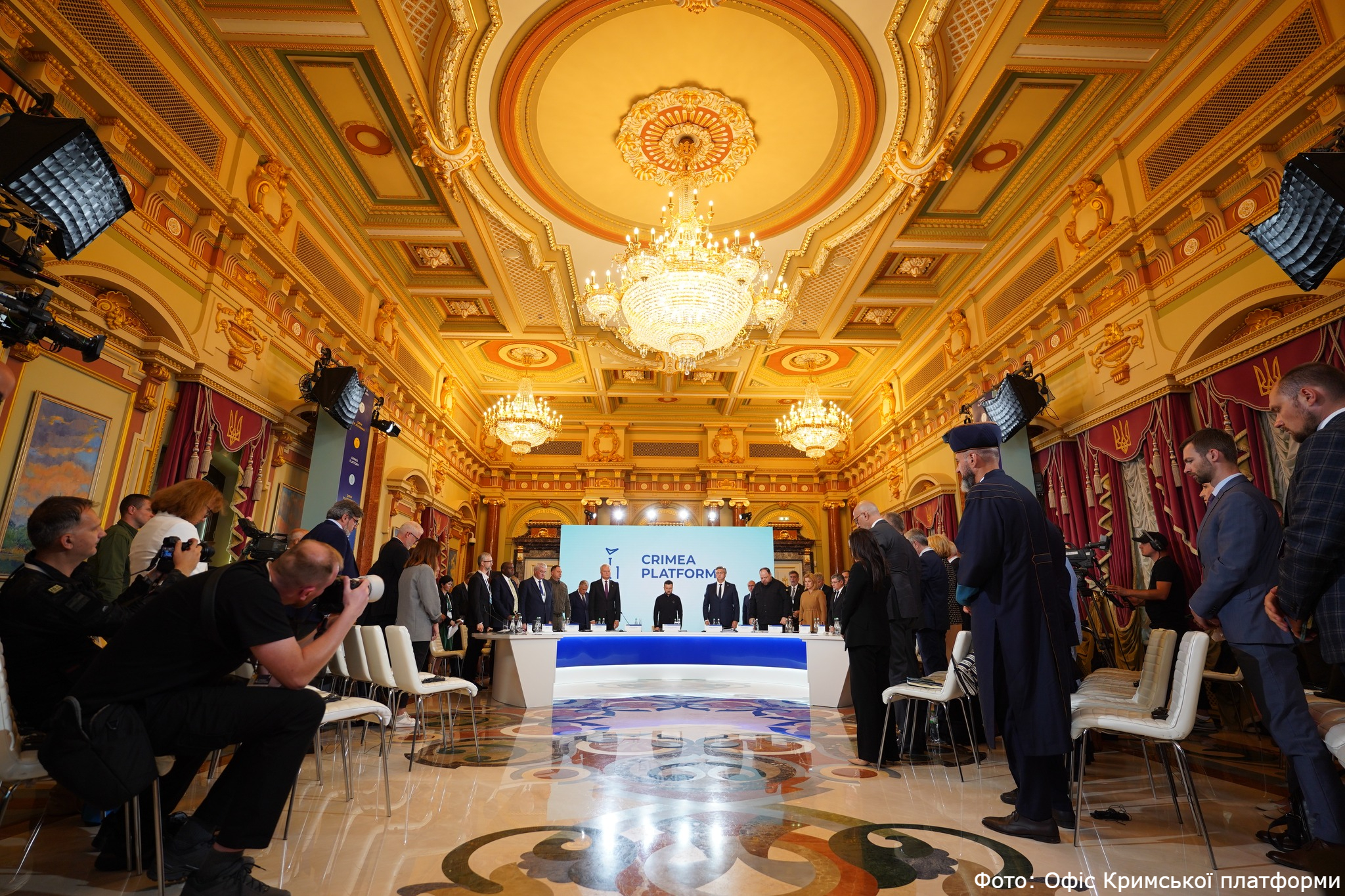
What is the International Crimea Platform, and how did the Fourth Summit unfold?
The Crimea Platform is an international advisory and coordination organisation initiated by Ukraine’s President, aiming to de-occupy the Crimean Peninsula. The activities of this platform, particularly the International Crimea Platform Office,
aim to enhance the global response to the occupation of Crimea, intensify international pressure on the Kremlin, prevent further human rights violations, and protect victims of the Russian occupation.
The platform also works with legislators of different countries and international experts to raise awareness among world leaders and the public about Russia’s occupation of Crimea, human rights violations, the security situation in the Black Sea region, global food security, and the rules-based international order. The Crimea Platform welcomes participation from countries and experts worldwide.
Ukraine hosts annual high-level meetings of the International Crimea Platform. On September 11, 2024, Kyiv hosted the Fourth Summit of the International Crimea Platform.
This year, the summit gathered more than 60 representatives from various countries and international organisations to address issues in occupied Crimea and expedite the peninsula’s de-occupation.
“Thanks to the Crimea Platform, thanks to diplomatic efforts, thanks to the resistance of our people, our soldiers, we are clearly forcing Russia to face reality, namely international law, the power of global solidarity, and the need to restore full justice for Ukraine and, ultimately, a lasting peace for our entire land and all our people,” President of Ukraine Volodymyr Zelenskyy emphasised in his summit address.
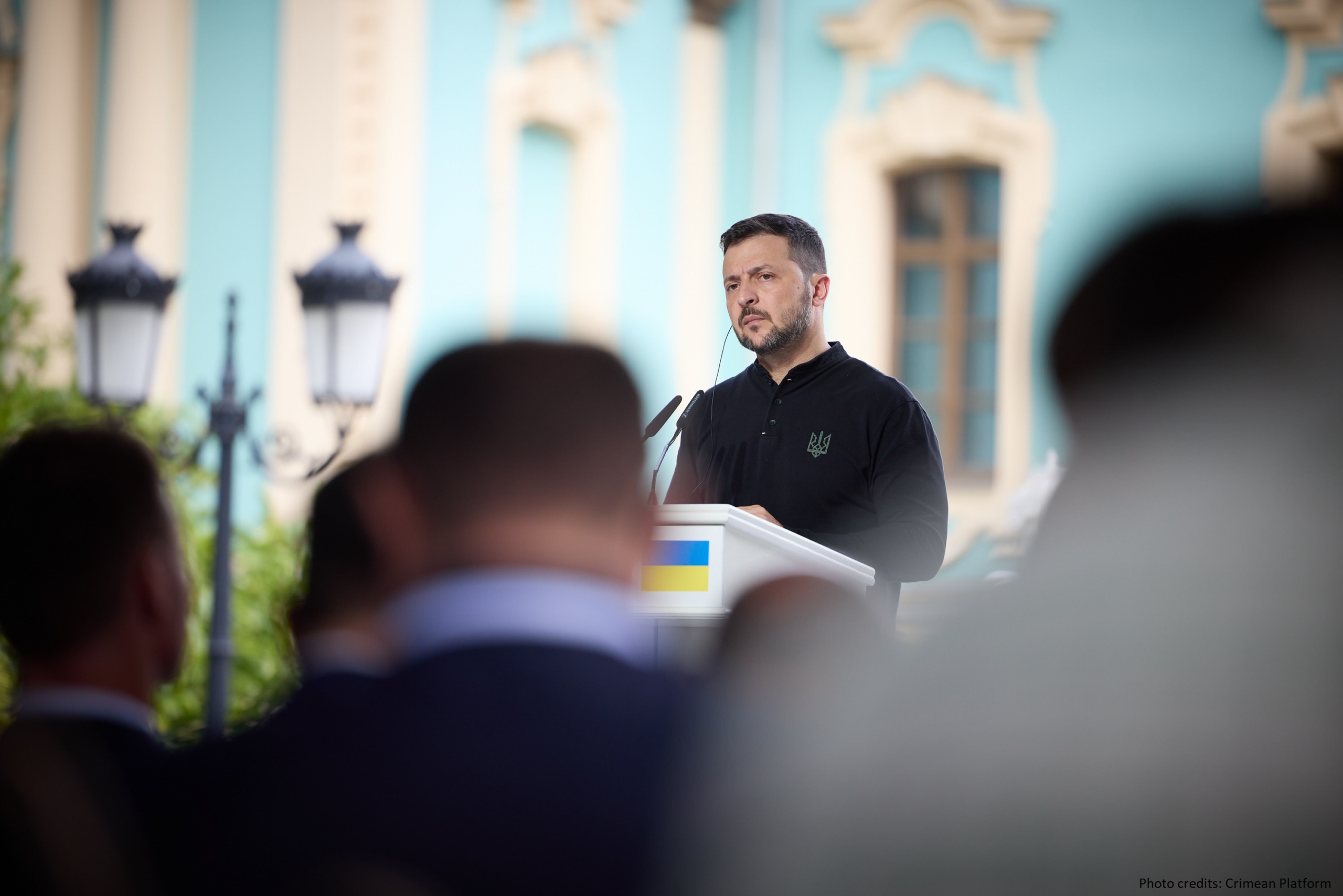 Volodymyr Zelenskyy
Volodymyr ZelenskyyParticipants reaffirmed their unwavering support for Ukraine and its efforts to liberate all occupied territories. The summit focused on thematic blocks related to the de-occupation and reintegration of the Crimean Peninsula, addressing key elements of the Ukrainian Peace Formula and the successes of Ukraine’s Security and Defense Forces in the Black Sea.
Ukrainian authorities do not believe that freezing the conflict will bring an end to the war. Kyiv is sure that doing so would only allow Russia to accumulate additional resources and continue with further stages of violence in Ukraine.
Ukraine believes that the defeat of the Russian Federation can be achieved through a combination of military, diplomatic, economic, and political pressure, backed by sufficient military support.
Security dimension
For years, the Kremlin has weaponised history, manipulating facts to justify its imperial ambitions. To achieve a just peace, the world must recognise the colonial nature of Russia’s actions and understand the deep roots of its aspirations regarding Ukraine and Crimea, said Rory Finnin, founder and head of Ukrainian Studies at the University of Cambridge.
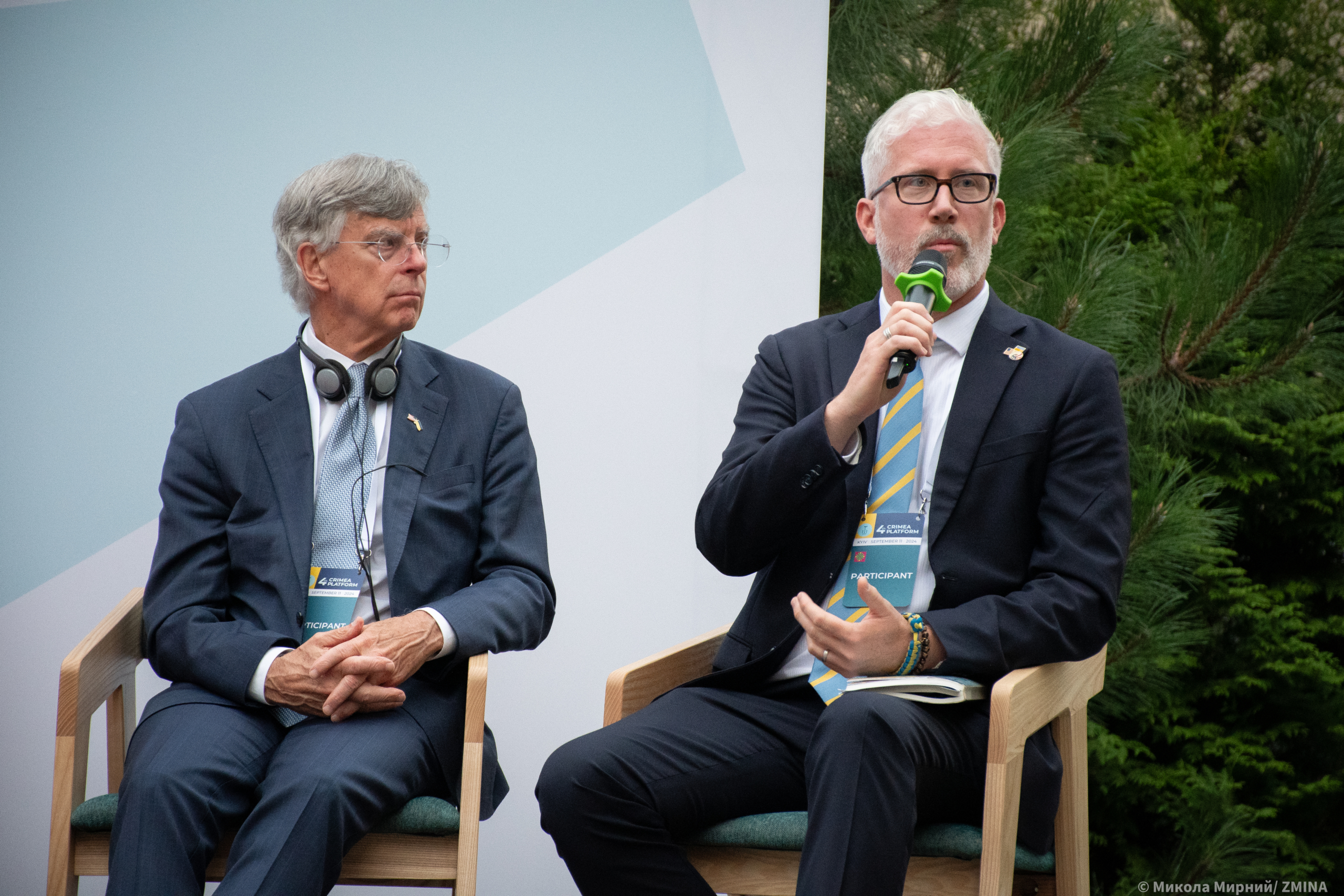 Rory Finnin
Rory FinninWilfried Jilge, a historian of Ukraine and Eastern Europe, also spoke during a panel discussion, “Crimea and the Peace Formula: Humanitarian aspect,” which occured within the Fourth Summit. He explained that there are indications that Russia has not abandoned its ambitions in the northern Black Sea region.
“We observe the development of railway logistics, training fields for urban combat, and occasional landing operation drills. We can’t be certain, but Russia may be preparing for another offensive operation next year,” Jilge said.
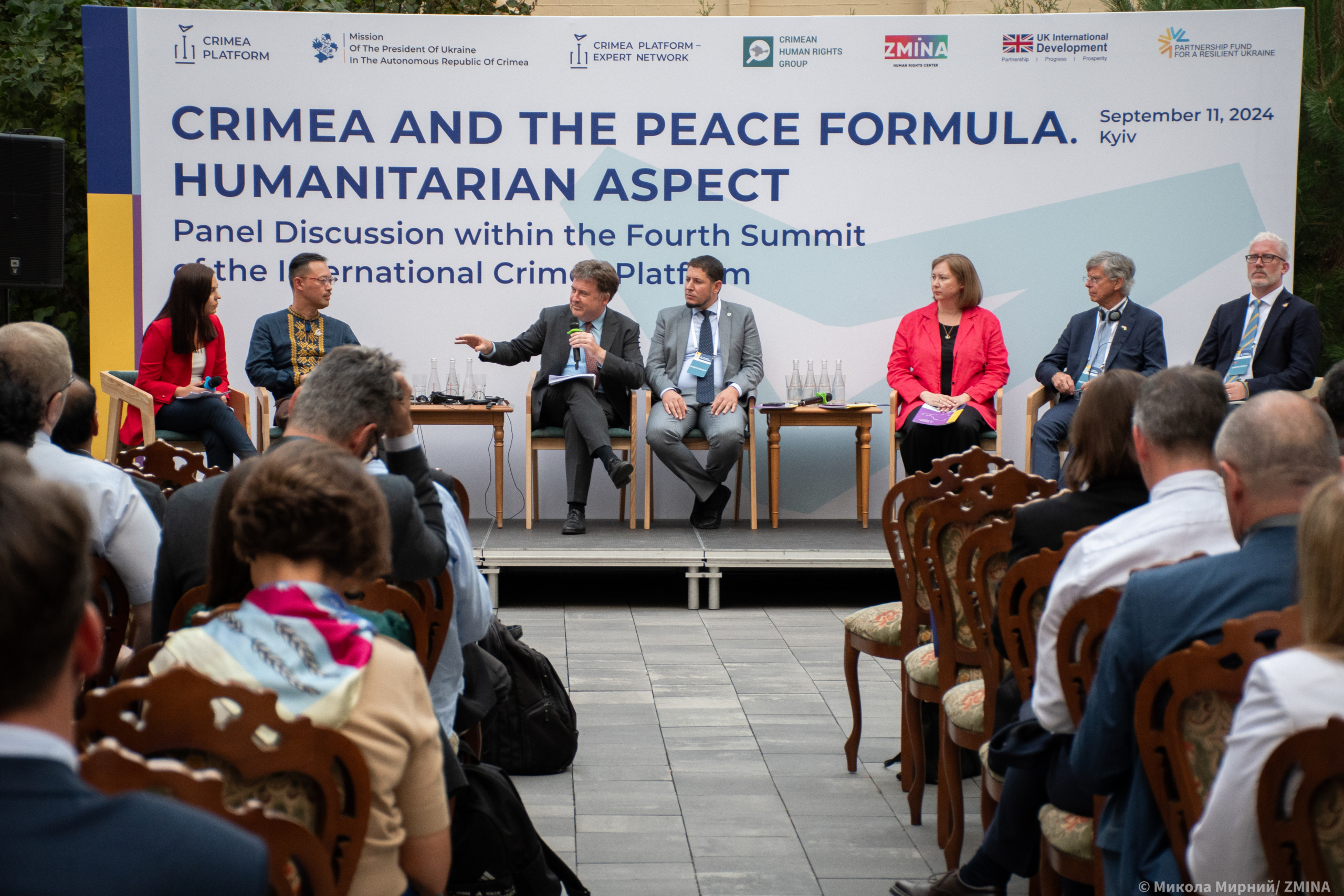
William B. Taylor, US diplomat and Vice President of the US Institute of Peace, outlined two approaches to resolving the situation in Crimea. One is through military means, citing U.S. General Ben Hodges, who believes Ukraine’s
objective is to make it impossible and unsustainable for the Russians to remain in Crimea.
Taylor also highlighted a diplomatic approach, referencing President Zelenskyy’s statements that if Putin and the Kremlin realise Ukraine will not stop fighting and that European support will persist, they might seek a diplomatic exit.
Taylor noted that US President Joe Biden initially said the United States would support Ukraine “as long as it takes.” However, Biden has recently shifted his stance, saying the United States will support Ukraine until it prevails.
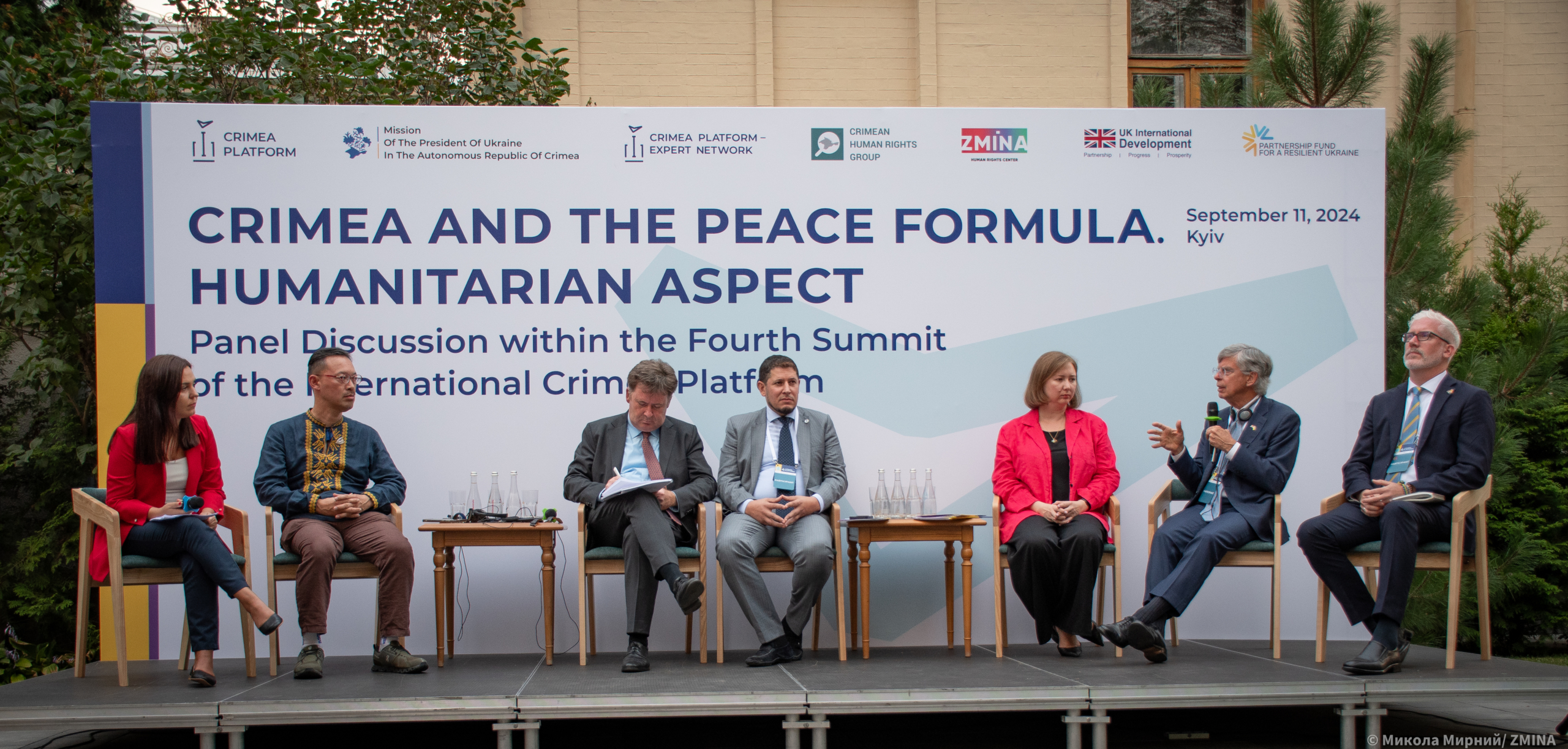
“When Putin and the Kremlin understand that Ukraine will not stop fighting, will not give up, and that Europeans will not stop supporting Ukraine, and when he understands what President Biden has said – that we will stay with Ukraine until they prevail – he will look for a way out,” Taylor explained.
Jilge also elaborated on the preconditions for peace and Crimea’s role in peace talks.
Pass the online course “Crimea: History and People” on Udemy.
Dr. Okabe Yoshihiko, Professor at Kobe Gakuin University and President of the Association of Ukrainian Studies in Japan, drew parallels between Russia’s actions in Ukraine and the territorial dispute over Japan’s Northern Territories. He explained that Japanese people are aware of Russian aggression in Ukraine and see similarities with the situation in the Northern Territories 80 years ago.
Dr. Yoshihiko highlighted that after World War II, 70,000 Japanese inhabitants of the Northern Territories had to return to Japan-controlled territory after two years of Soviet occupation. During this time, Soviet authorities issued passports to Japanese residents, raising fears that they might be considered Soviet citizens and prevented from returning to Japan in the future. Consequently, most inhabitants evacuated the islands, which Yoshihiko likened to a form of deportation.
He also reminded the panel that the Soviet Union detained 550,000 Japanese soldiers and sent them to Siberia after the war; almost 50,000 of them died there.
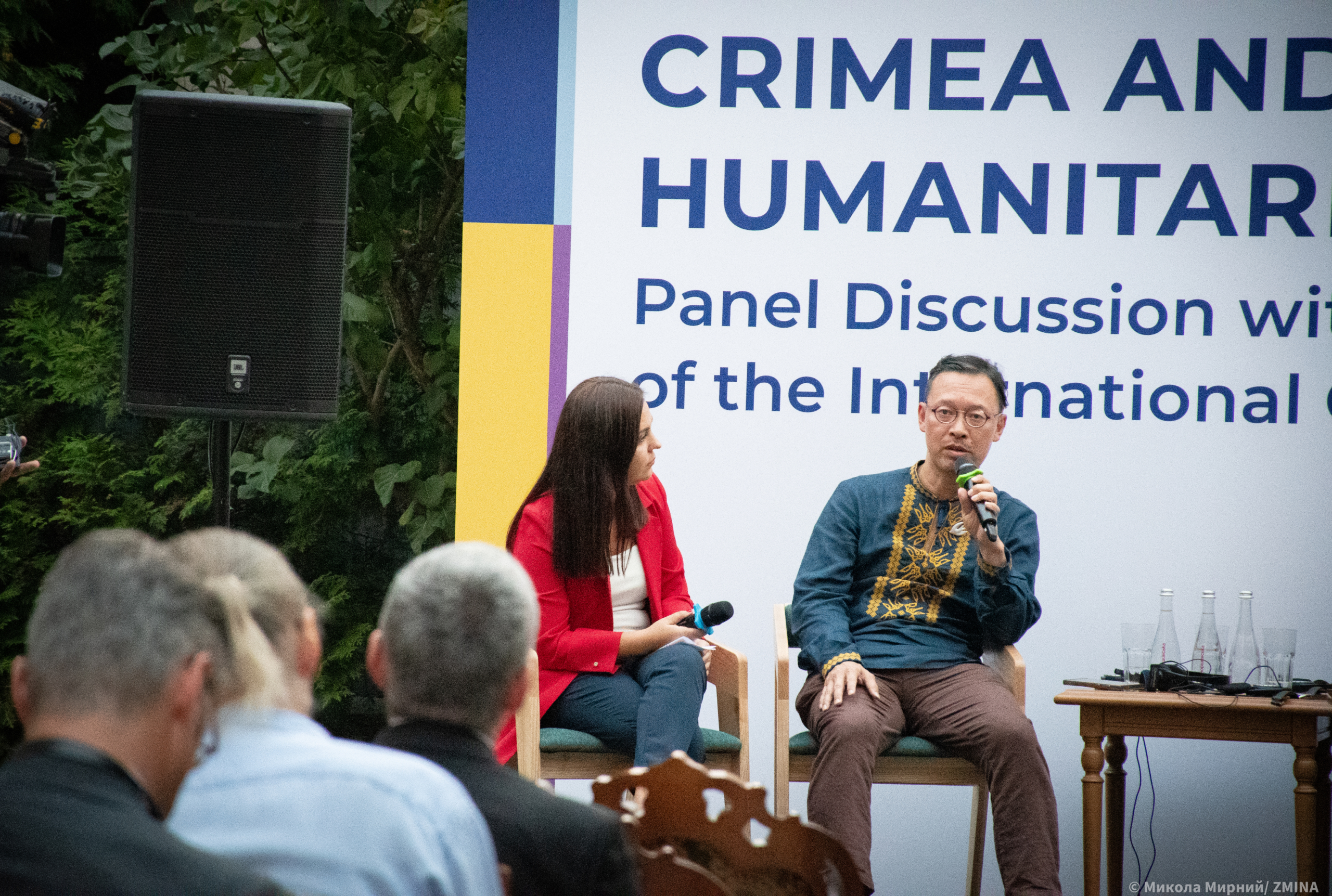 Dr. Okabe Yoshihiko
Dr. Okabe Yoshihiko“However, some soldiers returned to Japan very early because the Soviet Union educated them as communists. They may have been engaged in revolutionary activities. Of course, this is very similar to hybrid war,” he added.
Following the Summit, the participants adopted a Joint Statement emphasising their unwavering commitment to restoring Ukraine’s sovereignty and territorial integrity, including the de-occupation of Crimea, by continuing to provide Ukraine with comprehensive political, financial, and military assistance to counter Russian aggression.
After the summit, Ukraine’s Foreign Minister Andrii Sybiha urged states that did not attend the first Peace Summit in Switzerland to join the next summit, arguing that Kyiv’s Peace Formula is the only way to achieve a just peace in Ukraine.
“The Peace Formula has no alternatives and is the only path toward a comprehensive, just, and lasting peace. We invite every state, leader, and organisation that truly wishes peace to be restored to join the Peace Formula efforts alongside already a hundred global participants,” Sybiha wrote on X (formerly Twitter).
He emphasised that the Russo-Ukrainian war cannot merely be seen as a conflict between two states, because it is more accurately a colonial war of aggression waged by one hostile country against another.
“This war must end fairly in order to preserve international peace. We need a global diplomatic front to force the aggressor to peace,” he stressed.
The declaration of the first summit has been signed by 94 states, with preparations for the next meeting underway.
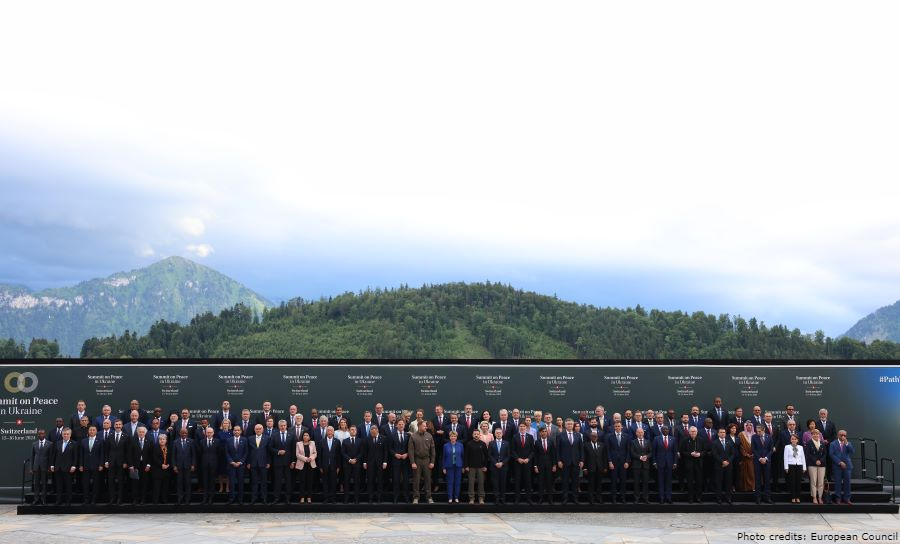 Family photo – Summit on Peace in Ukraine
Family photo – Summit on Peace in UkraineEarlier, Andrii Yermak, head of the Ukrainian President’s Office, explained that the invitation for a Russian representative to attend the second Peace Summit should not be interpreted as the start of negotiations with Russia. Ukraine wants to hold the second Peace Summit as soon as the preparation of a joint plan to implement each point of the Peace Formula is completed.
Release of political and civilian prisoners
After the Peace Summit in Switzerland and the signing of the Joint Communiqué on a Peace Framework by the countries, the fourth point of the Peace Formula was discussed during the Summit of the Crimea Platform as well. According to this point, all Ukrainian captives, including civilians, who are held in Russia and in the temporarily occupied territories of Ukraine, including Crimea, must be released by complete exchange of prisoners of war, the release of all unlawfully detained persons and the return of all internees and of civilians forcibly transferred and deported, including children.
The fourth point of the Peace Formula is also one of the priorities for the Ukrainian Ombudsman. The Ombudsman’s Office, along with a working group that includes the Canadian and Norwegian Embassies, is focusing on achieving this goal.
Elvin Kadyrov, Representative of the Commissioner for the Rights of Residents of the Autonomous Republic of Crimea and the City of Sevastopol, reported that the Ombudsman’s Office is verifying names, establishing new communication channels with foreign partners, and developing new mechanisms to help repatriate all Ukrainian citizens.
Dmytro Bohatyuk, head of the Department of the State Service on Matters Concerning Persons Missing under Special Circumstances of Ukraine’s Ministry of Internal Affairs, reported that as of July 2024, information on over 51,000 individuals had been entered into the unified register of missing persons. This includes data on approximately 42,000 people whose status is unknown, 7,000 with some information, and 3,000 Ukrainians whose whereabouts have been precisely established.
Earlier, ZMINA reported that Ukrainian prosecutors have launched more than 4,000 investigations into the abduction of almost 15,000 civilians in Russian-occupied territories.
Kadyrov stated that Ukraine has so far repatriated 3,244 POWs, 161 civilian prisoners, and 891 Ukrainian children from temporarily occupied territories and Russia.
“Some civilian prisoners are returning to Ukraine on their own. When you compare the figures, you understand that there is no mechanism for releasing civilian prisoners,” Olha Skrypnyk, head of the Crimean Human Rights Group said.
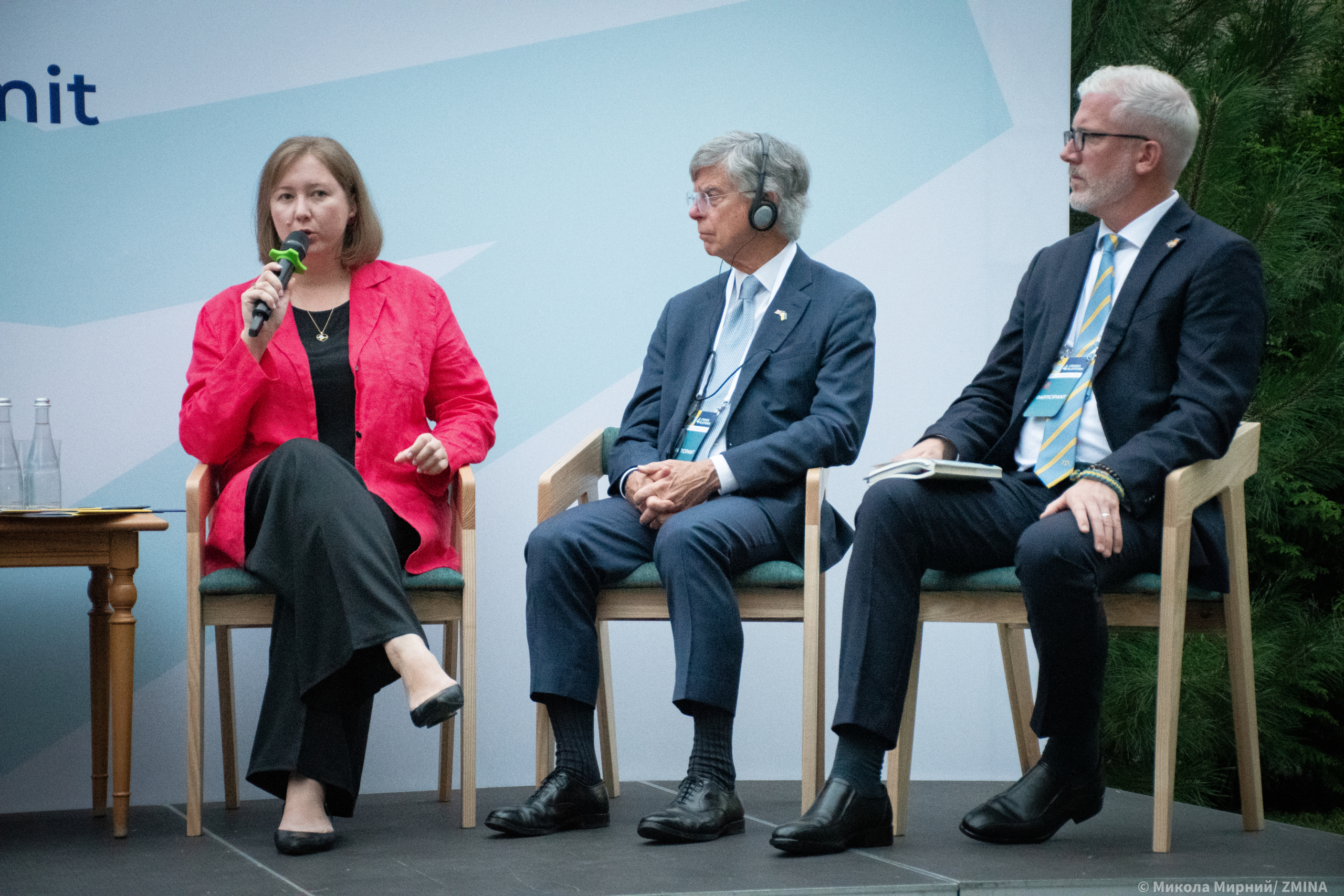 Olha Skrypnyk
Olha SkrypnykThe situation for Crimean prisoners is even more complex. Until 2022, Russia had returned to Ukraine only eight people from the temporarily occupied peninsula who had been convicted for political reasons.
“Many of them have been behind bars since 2014, when the occupation of Crimea began, as is the case with Valentyn Vyhyvskyy. Russia refuses to negotiate these cases at all,” Skrypnyk elaborated.
Currently, 219 Crimea residents are illegally convicted and held in Russian captivity, including 133 Crimean Tatars. Of these, 43 are under arrest (28 of them Crimean Tatars), 151 are imprisoned (97 of them Crimean Tatars), and 26 are without status (six of them Crimean Tatars).
Kadyrov emphasised that for over a decade, Russia has committed various human rights violations in temporarily occupied Crimea. These include violating freedom of speech and religion, conducting illegal searches and arrests, torturing Crimeans, forcibly displacing Ukrainian citizens, implementing forced mobilisation and passportization, and other kinds of repression.
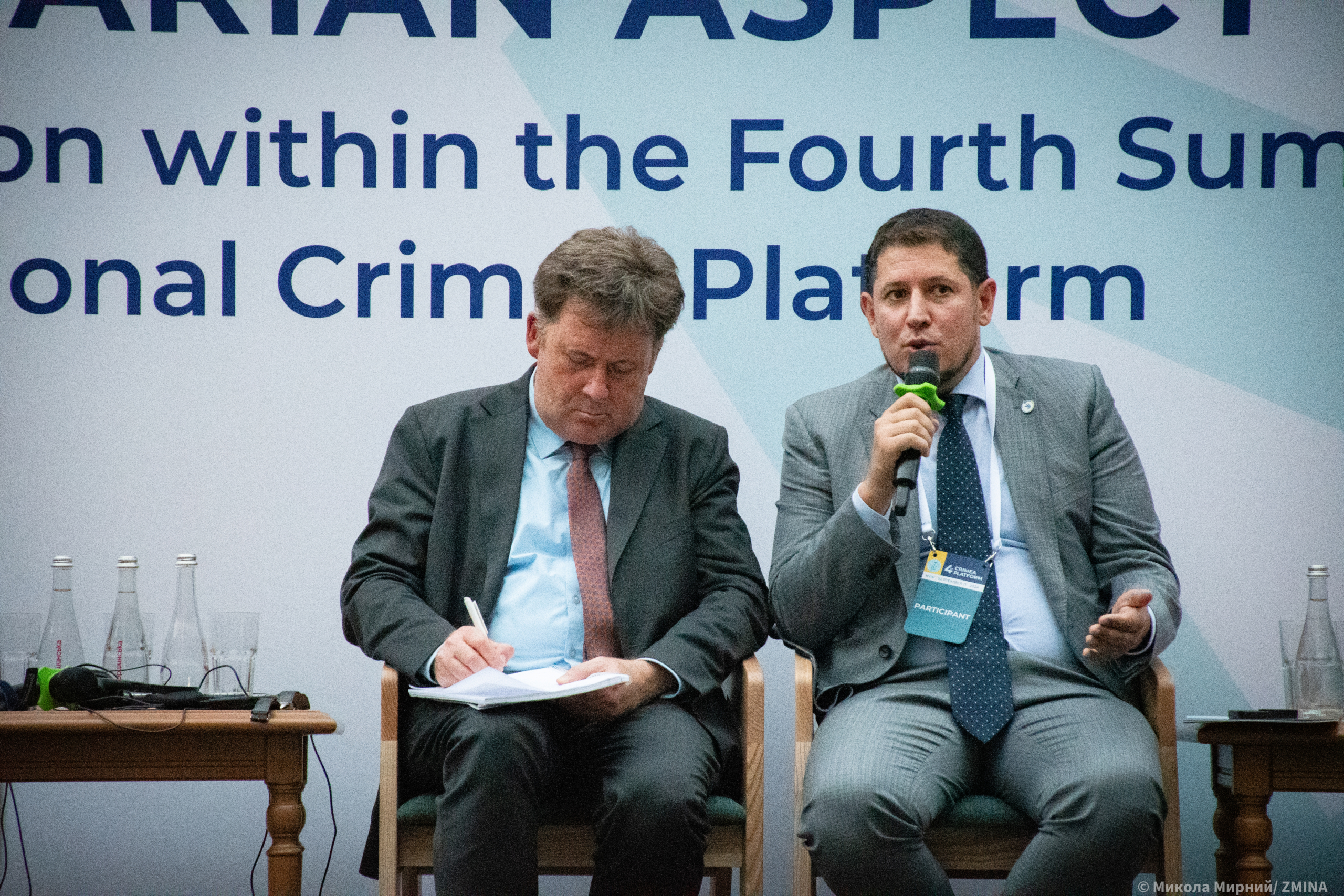 Elvin Kadyrov
Elvin Kadyrov“The imprisonment of Kremlin’s prisoners does not end the torture. In Russian prisons, people have been deprived of basic rights, including the right to human dignity and medical care, for ten years,” he said.
On June 28, Russia released ten Ukrainian civilians, including Nariman Dzhelyal, the deputy head of the Mejlis of Crimean Tatar People. Oleksandr Korniyenko, First Deputy Chief of the Ukrainian Parliament, called Dzhelyal’s release a positive example of cooperation with international partners.
“This is a good example of how international coalitions, various countries, Ukrainian diplomats, and Crimean Tatar leaders together achieved a good result. Nariman is with us; he is not home in Crimea yet, but at least he is in Kyiv,” Korniyenko said, also expressing gratitude to Türkiye and other Middle Eastern countries that participated in Dzhelyal’s release process.
Dzhelyal has been the only Crimean political prisoner released from Russian captivity in the last five years.
“Perhaps it is a glimpse of hope, a beginning. But the results depend on all of us. This hope is very much needed by the imprisoned Crimean political prisoners,” Kadyrov explained.
He stated that at least 40 political prisoners currently require urgent medical help.
“They are kept in such horrible detention conditions that their health has been impaired. These people do not count how many years they have left in prison; they count how long they have to live. For instance, Tofik Abdulhaziev has lost 40 kilograms. An independent medical commission stated that he was dying and that his disease was incompatible with life. The same situation applies to Amet Suleymanov, Iryna Danylovych, and 37 other Crimean residents. The civilized world is watching and cannot do anything. This is terrible,” Kadyrov emphasized.
Russia is also detaining Crimean political prisoners with disabilities. Among them are:
- Zekirya Muratov – disability of group 3і ;
- Oleksandr Sizikov – disability of group 1;
- Timur Ibrahimov – disability of group 3;
- Servet Haziyev – disability of group 2;
- Amet Suleymanov – disability of group 3;
- Timur Yalkabov – disability of group 3;
- Remzi Kurtnazirov, disability of group 2, currently under house arrest.
Oleksandr Sizikov’s 17-year prison sentence was finalized by the Vlasikha Appeals Court. Russia detained Sizikov, who is visually impaired, on July 7, 2020, following searches at his friends’ homes.
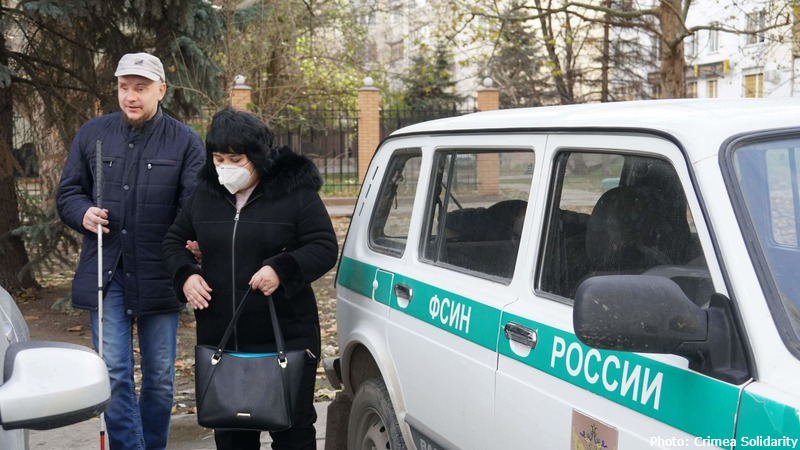 Oleksandr Sizikov and his lawyer Safiye Shabanova
Oleksandr Sizikov and his lawyer Safiye ShabanovaThe FSB claims that Sizikov “founded the Hizb ut-Tahrir terrorist cell in 2015.” As evidence of Sizikov’s guilt, the Russian intelligence service cited religious-political books found during the search. However, these books were not printed in Braille.
Many persecuted Crimean Muslim families have previously stated that Russian security forces planted Islamic literature, prohibited under Russian law, during searches to fabricate criminal cases against Crimean Tatars.
No other evidence was presented to show Sizikov’s guilt in the criminal case against him.
During the panel discussion, Kadyrov reminded the audience that International Humanitarian Law considers failure to provide proper medical care as a form of torture.
“We see that the Russian Federation is doing this intentionally. Russia has killed two political prisoners this way – Konstantin Shyryng and Dzhemil Hafarov. We see that this crime continues. Russia is challenging the international community and International Humanitarian Law,” he commented, adding that it is important to develop new, efficient mechanisms to address these violations.
"There are many declarations, but very few effective mechanisms. We all need to work for results," he added.
Ukraine will further promote the release of political prisoners among countries worldwide. Volodymyr Zelenskyy also appealed to Muslim nations at the Summit to help free Crimean political prisoners.
“We would like to advance these issues through your countries and governments and unite everyone for the release of other Crimean captives. We have to do more. Crimea is Ukraine, and let’s do this together,” Korniyenko concluded.
The Fourth Summit of the Internation Crimea Platform also marked the 80th anniversary of the deportation-genocide of the Crimean Tatar peopel. The Chairman of the Ukrainian Parliament, Rusland Stefanchuk, and his first deputy, Oleksandr Korniyenko, urged countries worldwide to recognise the USSR’s deportation of Crimean Tatars as an act of genocide.

Russia is currently prosecuting approximately 140 members of religious groups, including Jehovah’s Witnesses. In 2017, the Supreme Court of the Russian Federation recognised “Jehovah’s Witnesses” as an extremist organization and banned its activities within the Russian Federation. They were also illegally banned in the temporaritly occupied territories of Ukraine.
According to the Crimean Human Rights Group, at least 13 Jehovah’s Witnesses have been convicted for their faith in Crimea. Among them are:
- Artem Herasymov;
- Oleksandr Dubovenko;
- Yevhen Zhukov;
- Oleksandr Lytvyniuk;
- Volodymyr Maladyka;
- Volodymyr Sakada;
- Viktor Stashevskyy;
- Serhiy Filatov;
- Ihor Shmidt;
- Artem Shabliy;
- Maksym Zinchenko;
- Serhiy Parfenovych;
- Yuriy Heraschenko.
Wilfried Jilge recommended that churches, including those in Europe, be included in the release process.
“On the one hand, I was surprised about what Pope Francis said recently about the law in Ukraine on the Moscow Patriarchate. But on the other hand, we have no discourse in the Christian churches about what is happening with religious persecution [in the temporarily occupied territories], which started in 2014 in Donbas. We should be clear that it was with Calvinists, Evangelical groups, which are part of our European culture,” Jilge commented.
He expressed the belief that churches worldwide are unaware that Russia has started systematic persecution of various religions, including Christians, because they are not loyal to the occupying regime.
Olha Skrypnyk, head of the Crimean Human Rights Group, the human rights advocate, also stressed the need for timely and sufficient weapons and military equipment supplies.
“It may still sound unusual, but for us, human rights lawyers and advocates in Ukraine, it is absolutely necessary. The first necessity is weaponry for Ukraine. It is absolutely a human rights and humanitarian stance. Without weapons, we will not liberate the territories and save our people from captivity,” Skrypnyk elaborated.
Skrypnyk highlighted the dire conditions in which people from Kherson and Zaporizhzhya oblasts are being held in Russian torture chambers. According to cases documented by the Crimean Human Rights Group, the situation in these regions is drastically worsening, particularly for women.
“While women made up only 3-4% of Crimean political prisoners, they now account for 13-15% of those taken to Crimea from Kherson and Zaporizhzhya. This change illustrates the increasingly catastrophic nature of the situation,” Skrypnyk said.
She also noted the absence of an information campaign that would put the release of civilian and political prisoners on the agenda.
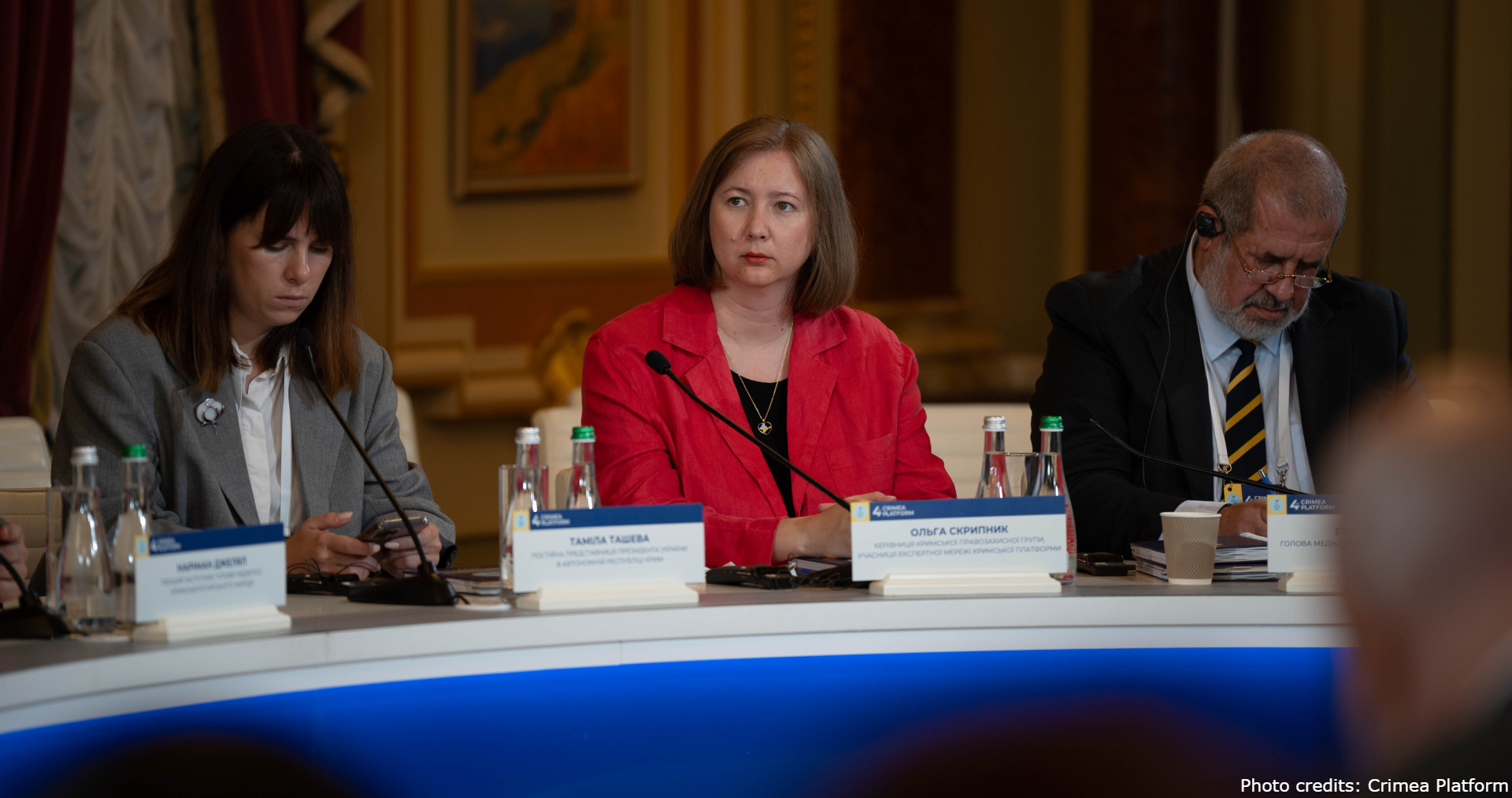 Olha Skrypnyk (in the middle)
Olha Skrypnyk (in the middle)“It hurts us. But, unfortunately, this issue is still unknown, even among our partner countries. This is also corroborated by our media monitoring. This year, we analysed more than 4,000 mentions of Crimea in the media of the US, Canada, the UK and other countries. Examining the thematic range, we notice that about 45% mention Crimea in the context of general hostilities in Ukraine, while another 25% discuss Crimea in a more global, geopolitical context. As for the topics we are focusing on today, only 3% of these mentions are about human rights violations on the peninsula. One percent is about political prisoners and less than 1% is about Crimean Tatars,” Skrypnyk revealed from the study results.
Human rights advocates call on international partners to help them engage at various levels in their societies, including the professional community.
“If we do not bring this information to these countries, Russian propaganda will fill the void. And it does. It appears at film festivals, telling stories about peaceful Russians who came to kill Ukrainians, as it was at the Venice Film Festival and TIFF and so on. I am sure this is a task that we can do together to strengthen the information campaign about civilian hostages. This is really what can make a change,” Skrypnyk emphasised.
Moreover, the subject of justice was also addressed, with Skrypnyk stating that Russia must pay for every crime committed in Ukraine, dating back to its operation to seize the Crimean Peninsula in 2014. Skrypnyk again urged the Council of Europe to allow claims to the Register of Damages from victims and relatives affected since the beginning of the Russian aggression in 2014. Currently, only Ukrainian citizens who have been impacted since the beginning of the full-scale invasion on February 24, 2022, are allowed to submit claims for damages.
This material has been funded by UK International Development from the UK government; however, the views expressed do not necessarily reflect the UK government’s official policies.


